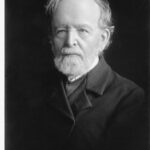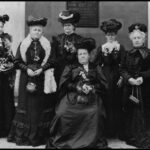In July 1882 Rev. Joseph Coles Kirby of Port Adelaide Congregational Church delivered a series of lectures on what he termed the Social Evil – broadly interpreted as drinking, prostitution and other forms of sexual licentiousness. Those present, following a similar movement in England, agreed to form the Social Purity Society (SPS), to combat what they perceived to be an epidemic of vice.
First Committee of the SPS
The first full committee, drawn from a cross-section of Adelaide’s leading citizens, met in October 1882, with John Howard Angas providing initial finance. A Ladies Division was established in 1883, along with suburban and country branches. Both male and female members adopted the Social Purity Pledge and swore to ‘protect . . . all women and children from degradation’, to avoid ‘jests and conversation, and behaviour derogatory to women’, to ensure ‘equal obligation of the law of purity on men and women alike’, and above all, to ‘fulfil the apostolic injunction, “Keep thyself pure”’ (Kirby, 1882).
Actions of the SPS
The SPS gave substance to its ideals as it attempted to awaken popular opinion and influence parliament. By 1885 it achieved legislation designed to protect young women from seduction and inducements to prostitution. The new law also raised the age of consent from 13 to 16 years. With varying degrees of success, the SPS agitated for legislation that would establish inheritance rights for children born out of wedlock and ensure that fathers contributed to their welfare, laws to curb public drunkenness, reform of laws that disadvantaged women financially and politically, and for an institution to teach girls ‘their womanly domestic pursuits’. The SPS also helped found the South Australian Women’s Suffrage League. While the SPS embodied a spirit of reform that was progressive in so far as it championed women’s social and political rights, its strident advocacy of sexual purity and temperance contributed greatly to South Australia’s reputation for wowserism.






Comments